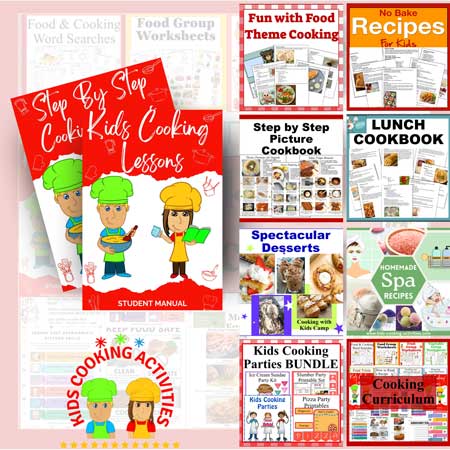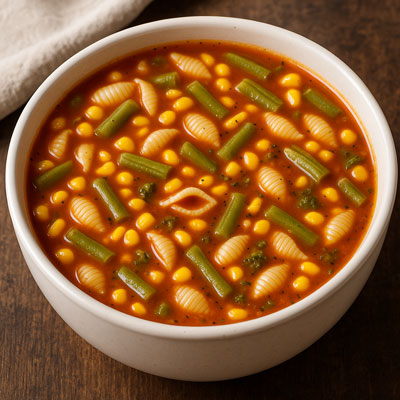Cooking Tips For College Students
Cooking in College

Kids Cooking Activities Teaching Materials
Make teaching easier with our activities and recipes compiled in theme sets and books with an easy to read formatPerfect for teaching!

~This post may contain affiliate links and I'll earn a small commission if you shop through them. There is no extra cost to you. This is how we help support our family and continue to bring you amazing content. To learn more see the affiliates disclosure here.~
Eating Frugally Ideas for College Students

Check your Dorm Kitchen:
Many universities today are apartment-style living quarters that are well equipped with modern cooking facilities. While such quarters have well-equipped built-in kitchens, college student's resources are usually limited. It's totally different when you cook in your mom's kitchen than on your own.Equipment Essentials:
Always stock up the basics: a plate, silverware, bowls, and a can opener. If you can access a kitchen, also get a good knife -a steak knife or even a chef's knife -and a big pot. If you lack bowls for mixing, you can use a large pot to mix the ingredients.Keep Cooking Basics on Hand:
Keep some of your favorite foods on hand to avoid late night fast food visits. Canned products are great -especially canned beans -as they always works well in microwaves. Supplement the canned goods with rice and you've got a good meal. Always stock your pantry with salt and pepper, and other seasonings, such as Cajun mix, to keep your meals interesting.Also remember to always stock the basic starches, such as pastas, rice and even potatoes as they keep for longer time. You can always make something with these starches plus a few fresh and canned veggies. It's good to learn to substitute especially if carrying or getting supplies is a problem. For example, you can purchase bouillon cubes instead of canned stock.
Shop smartly to save:
Your budget will be tapped out after paying for tuition and purchasing textbooks. While fast foods might seem cheaper and time saving, it's more economical and even healthier to prepare your own meals. Always buy in bulk the items that are on sale especially if it's something you love eating regularly. A great cost-cutting tip: even when cooking for yourself, it doesn't mean that you reduce a recipe for one serving. Make the full recipe and have the leftovers for lunch the following day or even freeze it for a future dinner.Take advantage of coupons alongside sales if possible to save as much money as you can. You may find generic or store brand items best for you, so do some math before choosing.
See more grocery shopping tips here.
Avoid the Freshman Fifteen:
While it might seem easy to eat pizza for every meal and very tempting to chow down on fries and ice cream, it doesn't mean you should. You should get some variety in your daily diet. Ensure your diet includes all the essential nutrients: eat your vegetables and some fruits to stay healthy.Avoid wasting food:
Make use of all your leftovers. You can use leftovers for lunches, for the next dinner, or to create another recipe. For instance, use leftover meat and veggies with a few new ingredients to make an excellent casserole or soup. If you can't eat something you prepared right away, freeze it for later use.Draw a budget:
Make a reasonable budget for food, and always try to stay within the set budget. Set aside a few coins on a weekly basis for stocking your pantry as well.Frugal Tips
- Substitute ground turkey with ground beef
- Plan your meals around what is on sale each week
- Buy extra of what is on sale to stock up your pantry
- Eat less meat each week and add more beans or lentils in your weekly meals
- Use your leftovers in meals the next day
30+ Frugal Meal Ideas
Jump to these frugal recipesDinner
Lunches
Breakfast

Frugal Dinner Recipes
ChiliSpaghetti
Rice and Chicken Casserole
Chili Mac Supper
Lo Mein noodles
Baked Ziti
Twice Baked Potatoes
Sloppy Joes
Bean Soup
Tuna Casserole
Beef Barley Soup
Pork Fried Rice
Black Bean Burgers
Yield: Serves 4
Prep Time: 10 Minutes
Cook Time: 20 Minutes
Ingredients
- 2 tbsp. vegetable oil
- 1/2 cup bread crumbs
- 1 large egg, lightly beaten
- 1 (15-oz.) can black beans, rinsed and drained
- 1 clove garlic, minced
- 1 onion, finely chopped
- 1 stalk celery, chopped
- 1 tbsp. cumin
- Salt and pepper
- Preheat the oven to 375°F. Prepare a rimmed baking sheet by lining it with foil and lightly coating it with oil.
- In a large skillet, warm oil over medium-high heat. Add onion and celery and cook, stirring frequently, for about 5 minutes or until softened.
- Add garlic to the skillet and sauté for another 1 minute.
- In a large bowl, mash the black beans into a thick paste. Add the cooked vegetables, then stir in bread crumbs, cumin, egg, salt, and pepper.
- Form the mixture into four patties and place them on the prepared baking sheet.
- Bake for about 10 minutes per side or until firm and set.
- Serve on whole grain buns with sliced red onion, tomato, and lettuce, if desired.
Tip: Buying dried beans and cooking them yourself is often cheaper than using canned beans.
Carrot Cauliflower Casserole
Yield: 8 Servings
Prep Time: 20 Minutes
Cook Time: 25 Minutes
Ingredients
- 1/2 cup bread crumbs
- 1 1/2 tablespoons unsalted butter, melted
- 3/4 cup light sour cream
- 3/4 cup light mayonnaise
- 3 cloves garlic, chopped
- 1 small onion, chopped
- 1 head cauliflower, cut into florets
- 1 pound carrots, sliced
- Salt and pepper
- 1 tablespoon chopped parsley
- Preheat the oven to 425°F.
- Cook carrots in salted boiling water for about 6 minutes. Add cauliflower and cook for another 5 minutes. Drain and rinse with cold water to cool.
- Spray a 9×13-inch baking dish with cooking spray and set aside.
- In a bowl, mix together sour cream, mayonnaise, garlic, onion, salt, and pepper. Stir in the cooked vegetables.
- Transfer the mixture to the prepared baking dish.
- Mix bread crumbs with melted butter and sprinkle on top of the vegetables.
- Cover and bake for about 20 minutes. Sprinkle with parsley before serving.
Tip: This dish is easily adaptable with whatever vegetables are in season or on sale.
Frugal Lunches
Macaroni and CheeseTomato Soup
Cream of Broccoli Soup
Easy Goulash
Chicken noodle soup
Taco Salad
Egg Salad
Egg Drop Soup
Spring Rolls
Clean Out the Cupboard Veggie Soup
Total Time: 20 MinutesPrep Time: 0 Minutes
Cook Time: 20 Minutes
Servings: 6

Ingredients
- 1 lb small shell pasta or other pasta you have on hand
- 1 (10 1/2-ounce) can tomato soup
- 1 can corn
- 1 can green beans
- 1 1/2 Cups water
- 1/2 tsp. ground pepper
- 2 Tablespoons garlic salt
- 2 Tablespoons basil
- In a large pan, combine tomato soup, corn, water, and green beans.
- Add basil, garlic salt, and pepper, and bring to a rolling boil.
- Add shell pasta and cook the mixture for about 19 minutes or until pasta is al dente.
Tip: Buying canned vegetables on sale can be cheaper sometimes than buying fresh produce. Stock up when the sales are on.
Chicken and Rice
Servings: 4
Ingredients
- 1 Cup uncooked rice
- 4 pieces chicken thighs
- 1/2 tsp. turmeric
- 2-inch piece ginger, minced
- 2 garlic cloves, minced
- 2 leeks or onions, chopped finely
- 3 Cups water
- In a large pan, sauté leeks, ginger, and garlic for several minutes.
- Add in chicken thighs and season with turmeric.
- Add rice and stir to coat everything evenly.
- Pour in 5 cups of water, lower the heat, and simmer for 30 minutes or until rice is cooked.
- Divide into serving bowls and top with a drizzle of soy sauce, if desired.
Frugal Cheap Breakfast Recipes
Omelets or scrambled eggsFrench Toast
Quiche
Homemade Oatmeal
Pancake Recipes
Potato Omelet
You can serve this potato omelet as is or you can stretch it
further by using it as a sandwich filling.
Servings: 3
Ingredients
- 6 eggs
- 1-1/3 Cups olive oil
- 1 large potato, scrubbed and finely sliced
- 1/2 onion, peeled & finely sliced
- Heat olive oil over medium heat. Add onion and cook, stirring, for a few minutes or until onion is tender and golden brown.
- Add potatoes; cook, covered, until the potatoes are tender but not mushy.
- Beat the eggs in a small bowl, add a pinch of salt. Pour the egg mixture into the potato mixture and stir gently to distribute the eggs well under the potato.
- Smooth the top and let cook for a few minutes or until set.
- Pop the entire mixture under a hot grill and let cook until the omelet is a bit puffy.
One Pan Crepe
This pancake has an eggy-soft center and crusty and browned outside. Its easy to prepare and cheap too.Total Time: 25 Minutes

Prep Time: 10 Minutes
Cook Time: 15 Minutes
Servings: 4
Ingredients
- 3 Tablespoons butter
- 2/3 Cup milk
- 1 tsp. salt
- 2/3 Cup flour
- 4 eggs
- Preheat your oven to 225°C/450°F. Coat a heavy 10-inch oven-proof skillet with butter and set aside.
- In a large bowl, beat the eggs, using a fork until well blended.
- Gradually beat in flour. Stir in milk and salt until well combined.
- Transfer the batter to hot skillet; bake in the oven for at least 15 minutes.
- Lower the oven heat to about 350°F and continue baking for another 10 minutes.
- Remove the pancake from oven and sprinkle with sugar or maple syrup.

See more Low Cost Recipes Here.
Follow Kids Cooking Activities






